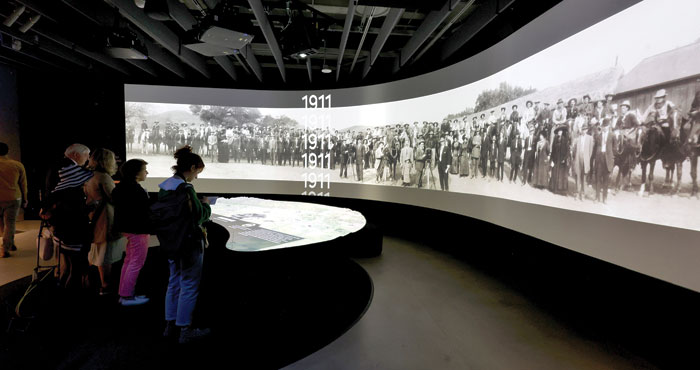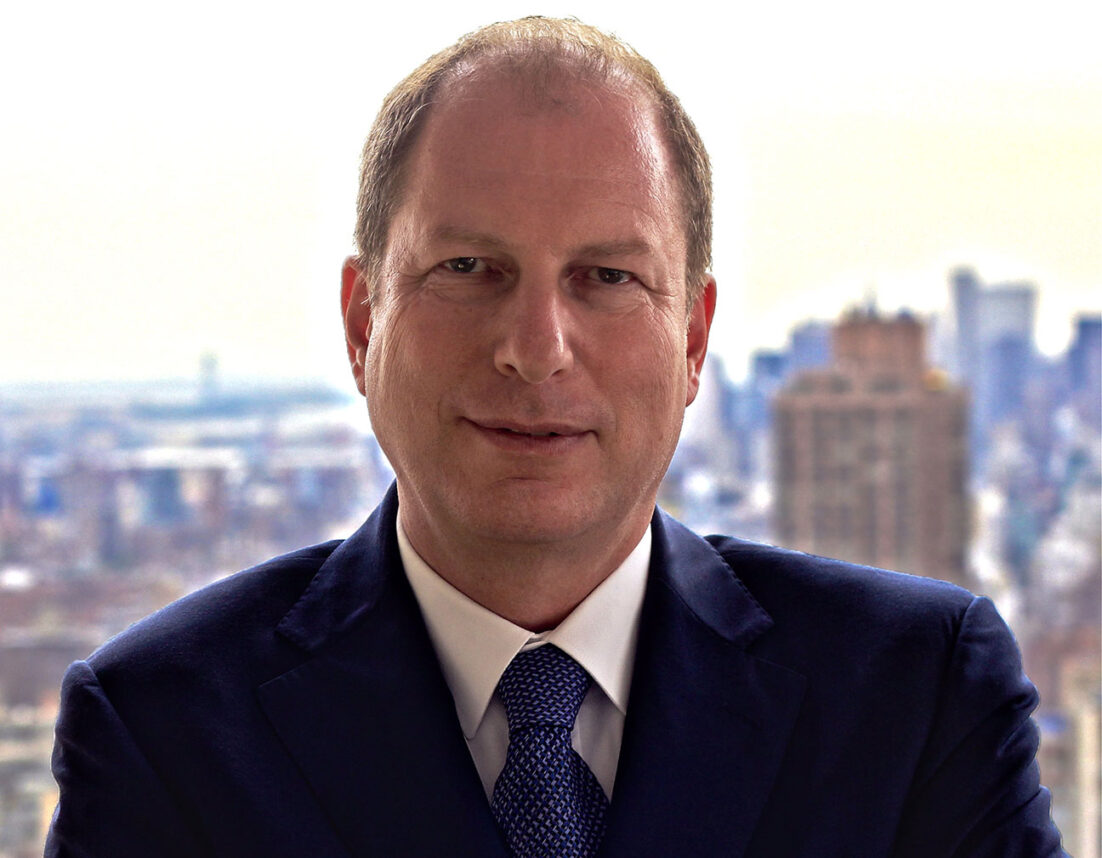 One of the installations at The Academy Museum’s “Hollywoodland: Jewish Founders and the Making of a Movie Capital” exhibit (Photo by Frazer Harrison/Getty Images)
One of the installations at The Academy Museum’s “Hollywoodland: Jewish Founders and the Making of a Movie Capital” exhibit (Photo by Frazer Harrison/Getty Images) As fate would have it, I had been rereading Neal Gabler’s “An Empire of Their Own: How the Jews Invented Hollywood” when, as a member of the WGA (also a past committee Vice Chair in Inclusion & Equity), I received an opportunity to sign the recent letter to the Academy regarding the new “Hollywoodland” exhibit at the Academy Museum of Motion Pictures.
It has always been difficult for Jews to publicly extoll their own. We worry about how it looks. We worry if we’re worthy. We worry about how it looks. We worry about what the repercussions will be over how it looks. We imagine all the gentiles saying, “Can’t those Jews just keep their heads down and be quiet!” (Who knows; maybe more are saying that these days than a year ago.) However, this museum demonstrates why we must not keep our heads down.
When you walk into the Museum of Science and Industry in Chicago, which I did many times as a kid, you are immediately met with real World War I planes (and now an added Boeing 727) hanging from the ceiling. A gigantic pendulum hangs from the 120-foot ceiling, moving continuously since the museum’s opening, powered by the movement of the Earth. Nearby is a gigantic steam locomotive and nearly a mile of model train tracks with multiple trains, just to name a few exhibits in the rotunda. You’re smacked in the face by the ideas of “science” and “industry.”
Entering The Academy Museum of Motion Pictures, one should be immediately greeted by an indoor “sculpture garden” of larger-than-life statues of Carl Laemmle, Adolph Zukor, Louis B. Mayer, The Warner Brothers, Zanuck, Fox, Cohn, etc., flanked by tributes and examples of their work. There’s a reason Gabler’s book opens with five extensive chapters, nearly 200 pages, on several of these men: They took what came before them — little nickelodeon rooms — and not only created Hollywood, but changed the country and the world — creating a narrative for what success and failure, happiness and sadness, victory and defeat, family, ambition, horror, science fiction, adventure, romance, etc. have meant in the modern age. They laid the groundwork for exhibitions that subsequent generations have camped out for days to see. They were giants, yes, with all the foibles giants have, but giants nonetheless, and they were Jews. (And, okay, everyone admits Harry Cohn was a jerk; you can squeeze that in somewhere, no doubt.)
They were, in fact, tough men in a very, very tough world in which much was denied them professionally because of their religion. They fought off an attempt by an uber-gentile, Thomas Edison, to completely control a business they had invested their lives and fortunes in, a business they were relegated to because they held onto their ambition when so many professional tracks were completely off the table. (Gabler repeatedly makes this point.) And yes, like seemingly everyone who becomes ridiculously rich and powerful, many of them also gave free reign to their libidos and piratic business tendencies. They were human beings. Human nature, as we see so graphically today, is the most powerful motivator of our actions and often not pretty. (It’s a Talmudic teaching, by the way, that the inclination to do bad is stronger than the inclination to do good, and Jews have done a lot of good in this country.) So? It’s not like they were financing slave ships. Or posting death threats to jurors.
They were, in fact, tough men in a very, very tough world in which much was denied them professionally because of their religion.
What is gained by demanding they be generations ahead of their time when it comes to civil rights and social and gender justice? Are they to be held accountable for every perceived slight, by a society that’s come to be dominated by splintered identity politics?
Hollywood has always been a sexual free-for-all and chock-full of professional abuse. It doesn’t make that admirable, but what is really gained by calling someone “a womanizer” in this context? You should be able to see it for what it is, an unfortunate cheap shot. Does the World War II Museum in New Orleans mention Eisenhower’s long-time affair with his driver, Kay Summersby? Of course not. Must we diminish Jack Warner to Brett Ratner? To what end? Must #MeToo – a movement whose importance is manifest – also be the yardstick by which museums are measured? And only the Jews are called out for exhibition?
I developed a theory about Los Angeles and Hollywood decades ago. The unspoken secret of Hollywood, and L.A., (and in reality, much of the entire far West) is that it’s halfway around the world from where Western Civilization all began. It’s the nth degree of social evolution; it ended here, where you couldn’t go any farther because of the ocean. Here is where people in this country and from other countries went – and, most notably in many cases, Jews – to get away from tradition and traditional expectations they had to answer to – both within their religion and from prevailing Christian society –and reinvented themselves in their own image.
Here Jews could change their names, marry non-Jews, exhale into an expanded moral code, and get away with a lot for a long time until the rest of the country caught up to them. (In Northern California it took a different turn – hippies and gay freedom; in Portland, it’s “Portlandia”.) Everyone who’s come since is here for some take on that endeavor. You can’t hold Hollywood up to Boys Town (the actual place, not the movie; the movie is the magician’s misdirection) as some sort of fair comparison.
Other peoples and religions don’t seek to undercut their own credibility like this. The Christians, despite billions paid out worldwide in settlements for sexual abuse scandals, seem to believe they have trademarked morality itself, when the first Bible was the Torah. Do they do it by listing settlement dollar amounts on a plaque at the Vatican or St. Peter’s? Does the Louvre have a large room where the behavioral peccadillos of da Vinci, Delacroix, Vermeer, Titian, and others are graphically on display? I toured the Musée Lumière in Lyon. I’m sure the Lumière brothers had bad habits; you just didn’t read anything about it in the exhibits. To quote Stan Lee, “’Nuff said!”
I understand that the museum is not a synagogue nor one of the many great Jewish museums. However, Jewish hegemony over Hollywood has been so complete for such a long time that Joel Stein could write an op-ed in the L.A. Times in 2008, nearly a century after Laemmle founded Universal and Zukor founded Paramount: “Who runs Hollywood? C’mon.” Must we go dig up dirt on these guys, too, for a credible museum experience? (OK, admittedly, Les Moonves requires little elbow grease.)
Lawrence Bender is completely right, and it’s not just the “Hollywoodland” exhibit that needs a major overhaul. The very idea of the Museum has to be rethought in terms of the unique and outsized contributions of its Jewish studio executives, producers, writers, directors, etc., but especially, The Founders. There should be a tasteful and exciting way to accomplish this end without needless repetition or being, as we say in the business, too continually “on the nose.”
Do not be the fingers at the end of the long arm of the ADL, worrying how it might look. Do not sacrifice these contributions on the altar of political correctness.
Instead, stand up and do us proud.
All the best,
Mitch Paradise
Mitch Paradise is a writer and producer living in Los Angeles. He also taught for 24 years as a substitute at more than 100 schools, PreK to 12th Grade, for the Los Angeles Unified School District.





















 More news and opinions than at a Shabbat dinner, right in your inbox.
More news and opinions than at a Shabbat dinner, right in your inbox.